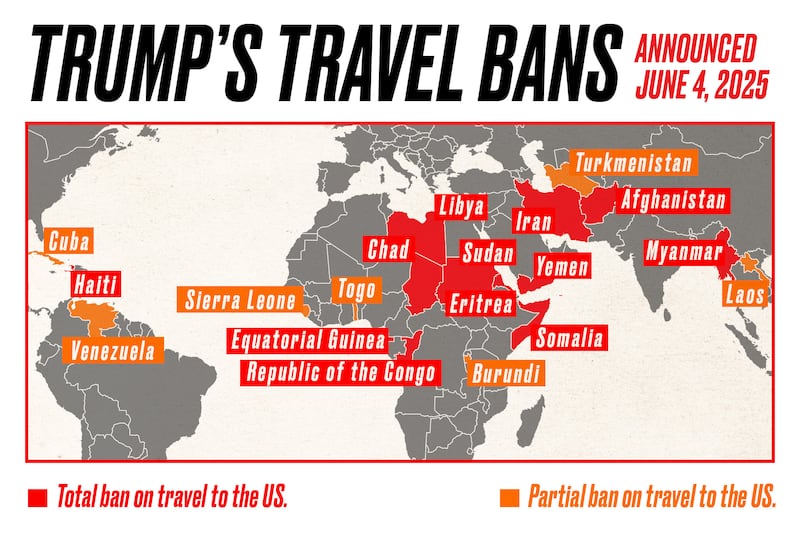Donald Trump has revived his first administration’s travel ban policy, signing a proclamation Wednesday banning travel from twelve countries and restricting travel from several more.
Banned from entering the U.S. are nationals from Afghanistan, Myanmar, Chad, Republic of the Congo, Equatorial Guinea, Eritrea, Haiti, Iran, Libya, Somalia, Sudan and Yemen.
Partial restrictions apply to people from Burundi, Cuba, Laos, Sierra Leone, Togo, Turkmenistan and Venezuela.
The proclamation carves out exceptions for lawful permanent residents, visa holders, World Cup and Olympics athletes and their immediate relatives, and people whose visit is deemed to benefit U.S. national interests, among other classes.
The ban, which goes into effect after midnight on Monday, was issued due to national security risks, the White House said. The antisemitic attack in Boulder, Colorado last weekend, in which several attendees at a gathering calling for the release of hostages held by Hamas were burned, spurred Trump to complete work on the proclamation quicker, CNN reported.
The attack “underscored the extreme dangers posed to our country by the entry of foreign nationals who are not properly vetted, as well as those who come here as temporary visitors and overstay their visas,” Trump said. ”We don’t want them.”
The suspect, Mohamed Sabry Soliman, is an Egyptian national who overstayed his visa. Egypt is not included in the president’s travel ban.
Deputy White House Press Secretary Abigail Jackson said the list of countries named in the proclamation includes those that show high visa overstay rates, among other qualifying factors.

“President Trump is fulfilling his promise to protect Americans from dangerous foreign actors that want to come to our country and cause us harm,” she wrote on X. “These commonsense restrictions are country-specific and include places that lack proper vetting, exhibit high visa overstay rates, or fail to share identity and threat information.”
A White House fact sheet offered justifications for each country. Libya, for instance, has “no competent or cooperative central authority for issuing passports or civil documents,” it states.
Libya was among the countries Trump singled out in his initial travel ban in early 2017, a move which sparked widespread protests in part because each of the seven nations were predominantly Muslim. Though Trump cited national security and not religion, he had called for a ban on Muslims’ entry into the U.S. during his 2016 presidential campaign.
Legal challenges to that ban were filed almost immediately. The Trump administration then reworked the language of the ban, and it was ultimately upheld by the Supreme Court in 2018.
That decision, Trump v. Hawaii, was cited in the White House fact sheet Wednesday, along with a national security-related executive order Trump signed in January.






